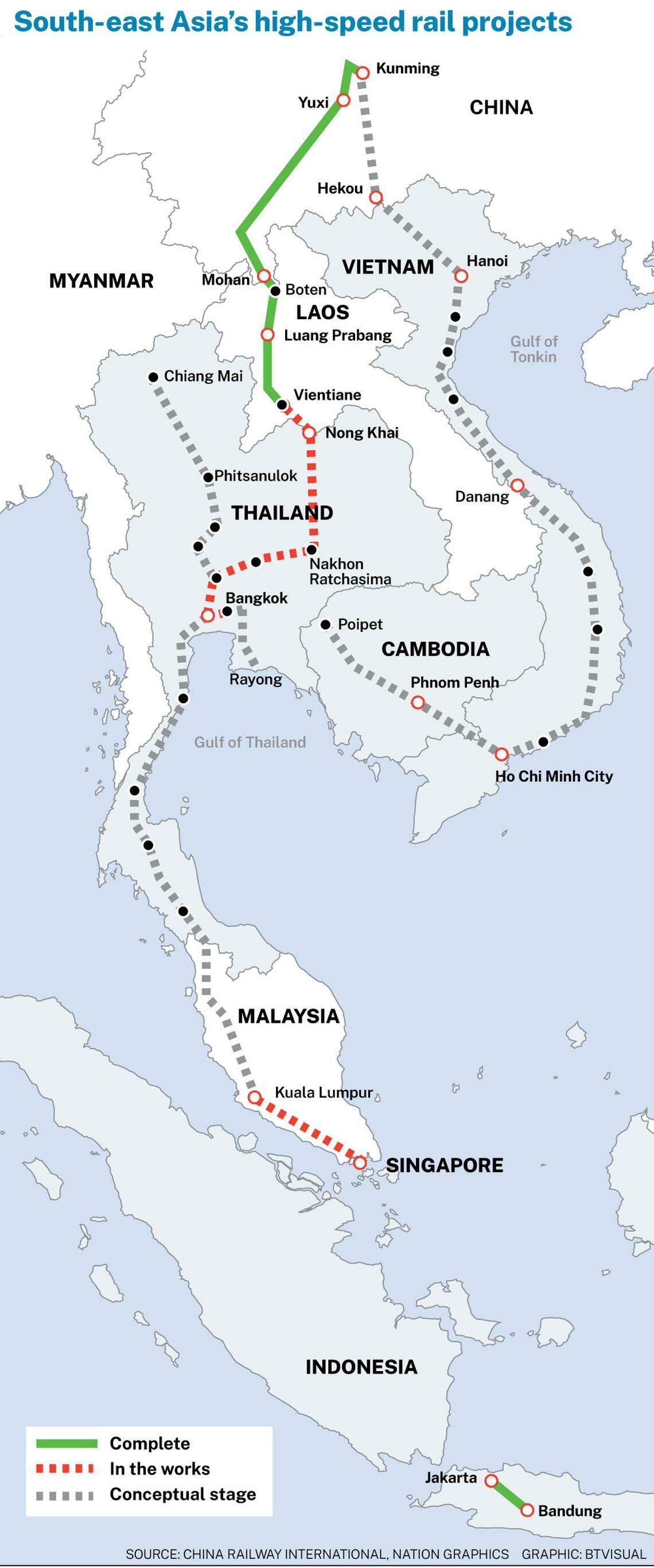Thailand’s high-speed rail link to China delayed at least two years, incurs extra costs

THAILAND’S high-speed rail (HSR) project – which aims to link the capital Bangkok to Chinese city Kunming via Laos – is likely to be delayed by about 28 months and require around an additional 4.7 billion baht (S$176 million) in funding.
The 434 billion baht project was first proposed back in 2010, and both governments pledged their cooperation for its construction in Dec 2014.
In 2022, Thailand said it wanted to complete the first stage by 2026 and conduct an official launch the following year. But on Monday (Feb 26), broadcaster Thai PBS World reported that the kingdom’s state-owned rail operator agreed to change the design of a section of the railway, leading to the delay and extra construction cost.
Nirut Maneephan, governor of the State Railway of Thailand, was quoted as saying that a 7.9 km section of the track originally meant to be ground-level will now be elevated, to alleviate the construction’s impact on the community. The move was reportedly made in response to complaints from residents in the Nakhon Ratchasima province.
If brought to fruition, the 609 km rail link will connect Bangkok to the Laos-bordering Thai province Nong Khai.
The first stage of the project runs about 251 km from Bangkok to the Nakhon Ratchasima province and is budgeted at around 170 billion baht. It includes stations at Bang Sue, Don Mueang, Ayutthaya, Saraburi, Pak Chong and Nakhon Ratchasima.
A NEWSLETTER FOR YOU

Asean Business
Business insights centering on South-east Asia's fast-growing economies.
This section of the railway is currently under construction and is more than 15 per cent complete.
A bridge will then be built over the Mekong River to connect the Thai HSR with the Laos-China line, a US$6 billion railway that was launched in Dec 2021 and connects Laotian capital Vientiane to Kunming.
Who’s funding it?
Thailand is footing the entire construction costs of the first phase of the project, while China is responsible for the system installation, design, and procurement of the trains.
In 2016, Thailand’s HSR project was delayed when Bangkok rejected Chinese financing over high interest rates.
In January, Reuters reported that Chinese Minister of Foreign Affairs Wang Yi had urged Thai Prime Minister Srettha Thavisin to accelerate construction and promote early implementation of the rail link.
HSR projects in South-east Asia
Besides the Laos-China Railway, another completed rail project in South-east Asia under Beijing’s Belt and Road Initiative is Indonesia’s US$7.3 billion HSR project linking its capital Jakarta to Bandung. It was launched last October.

Other proposals in the region include the Kuala Lumpur-Singapore HSR and Vietnam’s North-South HSR project, a US$70 billion venture that links the capital Hanoi with the southern metropolis of Ho Chi Minh City. Both projects have been stalled indefinitely.
In a bid to revive the project that was terminated in 2021, Malaysia called for the private sector to submit concept proposals for the Kuala Lumpur-Singapore HSR last July, of which it has received seven as at January 2024.
As for the North-South HSR project, Vietnam’s Transport Ministry announced in December that it aims to begin construction before 2030, and have the first trains in service by 2045.
KEYWORDS IN THIS ARTICLE
BT is now on Telegram!
For daily updates on weekdays and specially selected content for the weekend. Subscribe to t.me/BizTimes
Asean
Malaysian fast food operator QSR shelves IPO plans amid boycott campaign: sources
Microsoft to invest US$1.7 billion in cloud, AI in Indonesia: CEO
Thai economic growth slows in March due to soft demand, tourism
Bangkok airports set for US$4.8 billion expansion as tourism booms
Indonesia’s Mount Ruang erupts again, closes international airport
Singapore, Indonesia to deepen cooperation on green economy

